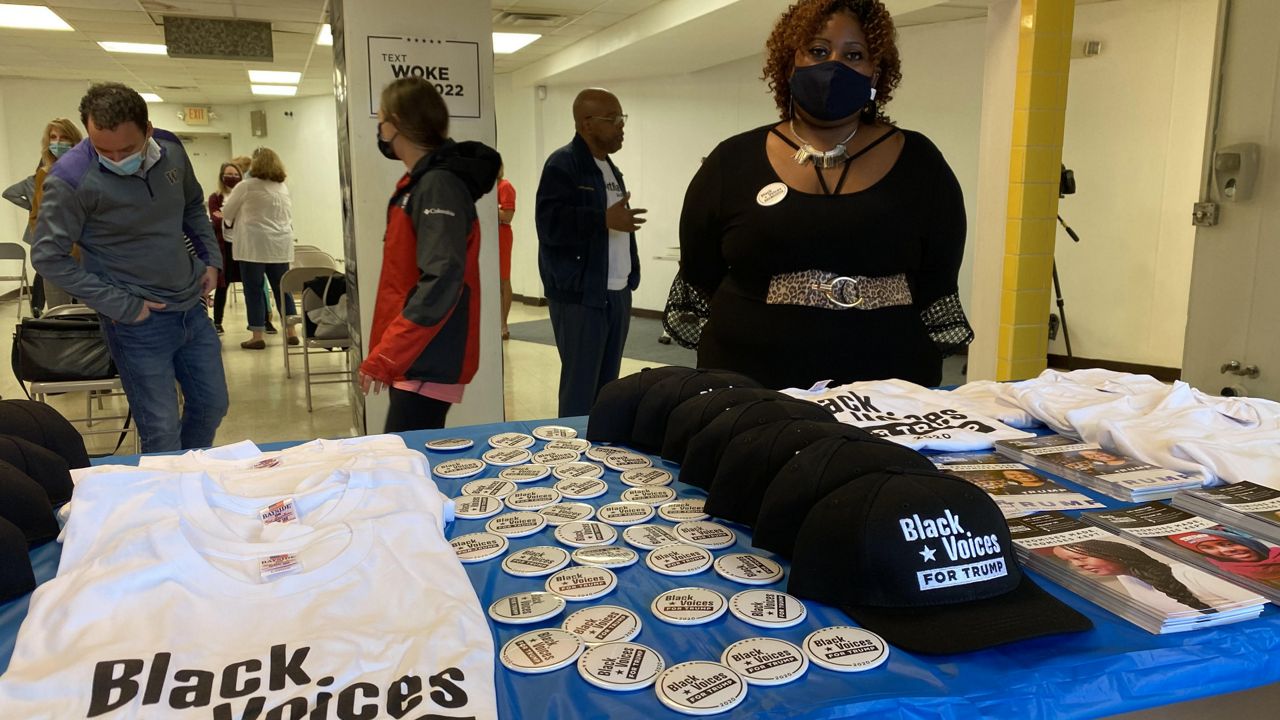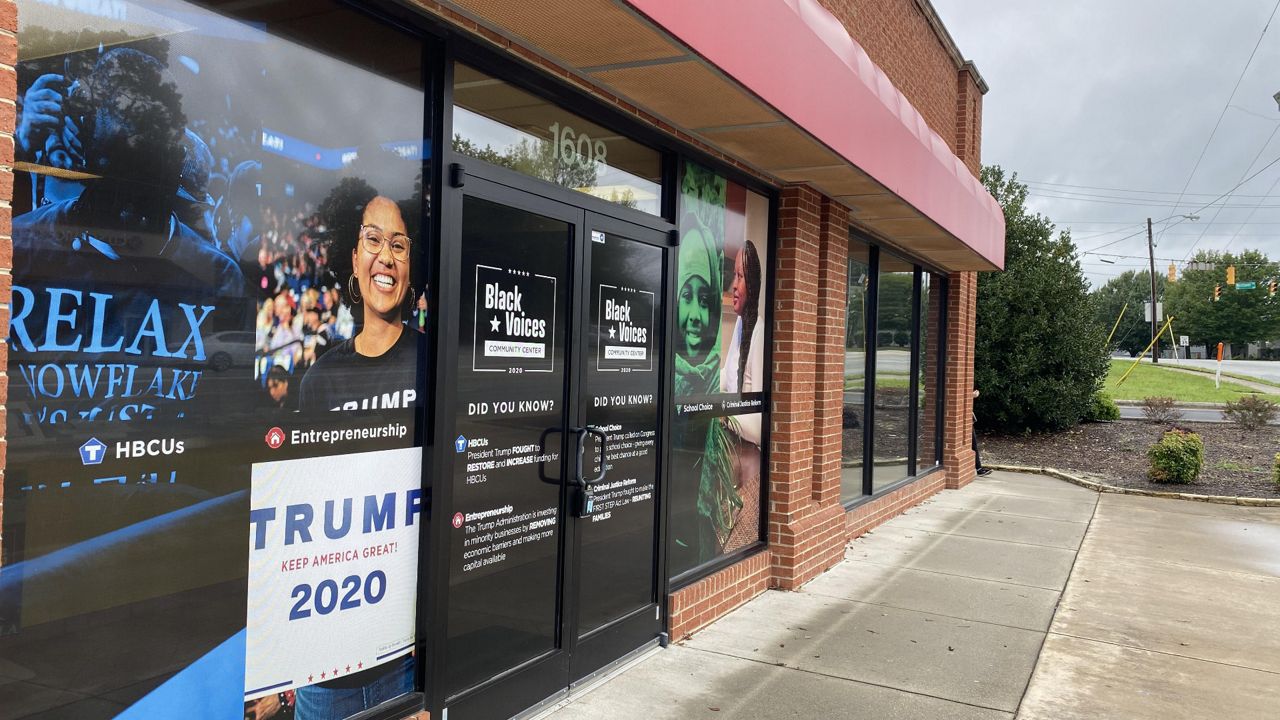This story, focused on the Trump campaign, is the second in a two-part series on how the Republican and Democratic presidential campaigns are reaching out to Black and Hispanic voters in North Carolina. See Part One, looking at the Biden campaign, here.
GREENSBORO, N.C. — Gathering in a converted storefront, now a "Black Voices for Trump" office, volunteers lowered their heads in prayer before going out to knock on doors in a nearby neighborhood.
“We thank the Lord for President Trump,” Pastor Apostle Wiggins said Friday morning as he stood in front of the room with 20 or so volunteers for the Trump-Pence campaign. About half wore masks, and chairs were separated by about three feet each.
Knocking on doors and reaching out through communities is a big part of the campaign’s efforts to sway voters of color to vote for President Donald Trump.
Polls show a close race for North Carolina’s 15 Electoral College votes, and give Joe Biden a slight lead in the state. When it comes to swaying Black voters, the Trump campaign could have an uphill battle.
A recent CNN poll shows only 18 percent of likely voters who identify as people of color support Trump, with 76 percent supporting Biden.
North Carolina has 7.1 million registered voters. Of those, about 1.5 million are Black and about 221,000 are Hispanic, according to the state Board of Elections.
Danielle Alvarez, the Trump campaign’s communications director for the southeast, said she is not putting much stock in public polls. “If polls were the guide, Hilary Clinton would be running for re-election right now,” she said.
“Internally, we are feeling very confident,” Alvarez said in an interview with Spectrum News 1. “We are not going to concede a single vote.”
After the brief prayer, longtime Greensboro activist Clarence Henderson stood up to rally the troops. Henderson rose to prominence in the 1960s civil rights movement when he sat at the segregated Woolworth lunch counter in Greensboro.
Rallying the volunteers to campaign for Trump, Henderson said, “They keep calling him a racist.”
“Tell me what policy he’s done that’s racist.” Henderson pointed to Trump’s efforts to release low-level criminal offenders from prison and his establishment of “opportunity zones” for economic development in poor areas.
Democrats, he said, “want to say to you and me that we are victims.”
When the group goes out into the field to talk to voters, Henderson said they should work to figure out the values of the people they are talking to, then connect Republican policies to those values before ever saying that they are with the GOP.
For religious people, ask them who added the word “God” to the Pledge of Allegiance, or who made Black History Week into Black History Month, Henderson said. That was Ronald Reagan on the pledge and Gerald Ford for Black History Month, he said, both Republican presidents.
In a separate interview, Henderson said the Republican Party’s messages of pro-life and school choice resonate with Black voters.

Volunteer Chanel Harris, who traveled from Raleigh to help with Friday’s campaigning in Greensboro, manned a table stocked with Black Voices for Trump hats, T-shirts and buttons to give away.
The messages resonating in her community are about lowering taxes, school choice, and growing Black-owned businesses. She said new funding for Historially Black Colleges and Universities also appealed to people she talked to.
Late last year the president signed a bipartisan bill into law giving $250 million a year to HBCUs and other institutions that serve minority students. A bill that previously funded HBCUs expired last year.
Knowing what issues people care about the most is important to people running the campaign like Alvarez, the regional communications director.
“You have to look at your ground game and how you communicate with voters,” Alvarez said. She said the Trump campaign has invested hundreds of millions of dollars in their data and on-the-ground operations to be able to connect with voters on the issues that matter to them.
“What moves a voter?” she asked hypothetically in an interview with Spectrum News 1. The campaign collects 3,000 data points on each voter in their database so they can know what that person cares about and what arguments they should make about Trump and the other GOP candidates on the ballot.
She said the Trump campaign is not approaching communities “as though they’re monolithic.”
She said Latino communities are very diverse. Issues that speak to Cuban American voters are not the same as those that may be on the top of the list for a voter from Puerto Rico.
“When you talk about the Latino community, it needs to be plural ‘communities,’ ” she said.
The campaign’s work on the ground, Alvarez said, could make all the difference. She said the Trump campaign has 120 staffers in the field around North Carolina organizing volunteers and working to get out the vote.
Staff members in the field, she said, “train volunteers to take ownership of their communities.” She said the most important campaigning involves “neighbor-to-neighbor, peer-to-peer conversations.”
“You have to do that voter contact,” she said. Alvarez added that volunteers are very cautious when they go out to knock on doors, wearing masks and social distancing to help protect from COVID. She said the campaign has not heard much pushback about their strategy that still involved in-person campaigning during the coronavirus pandemic.
Duke University political science Prof. Kerry Haynie said in recent elections “both parties have lost their way” with making personal contact with voters.
Black and Latino voter turnout could have swung North Carolina to Clinton in the 2016 election, he said in an interview with Spectrum News 1.
He said the amount of time and money the Trump campaign is spending on North Carolina stands out this year. “The fact that (Trump) is spending so much time in this state should worry Republicans,” he said.
Alvarez, whose parents are from Cuba, said the Trump campaign’s messaging around Democratic policies they call “socialist” speaks to many Latino voters.
That message is especially effective with voters whose families, like hers, come from countries like Cuba or Venezuela.
She said the president’s law-and-order message can also appeal to Latino voters. “A lot of us come from countries where law and order doesn’t exist,” she said. “You call 911 and it goes to voicemail.”
On economics, the Trump campaign recently released a new Spanish-language television ad, titled “Chinese Tale.”
The message of the ad, according to the campaign, is, “Biden’s pro-China agenda has hurt Hispanic families, including our fellow Americans in Puerto Rico who saw their jobs and major industries sent to China under his failed policies.”
The advertisement argues that Trump’s trade deals and “America first” policies are the best way to protect American jobs.
But back in Greensboro, the message for volunteers headed out to knock on doors Friday was not about foreign trade deals, it was about school choice, about supporting minority-owned businesses, and about the GOP’s pro-life position.
As Henderson said, the volunteers should connect with whoever they were talking to, figuring out what matters most to them, and bringing that back to why they should vote for the Republican ticket.



